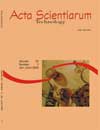<b>Síntese de Software Adaptativo baseada em Especificações, <em>Extended Dataflow</em></b> - DOI: 10.4025/actascitechnol.v27i2.1458
DOI:
https://doi.org/10.4025/actascitechnol.v27i2.1458Palavras-chave:
modelos computacionais, sistemas embutidos, fluxo de dados, componentes, eventosResumo
As abordagens de desenvolvimento de software embutido têm feito o uso de modelos de computação, tais como fluxo de dados, eventos discretos, síncrono/reativo, dentre outros. A especialização desses modelos faz com que sejam apropriados a um domínio específico de aplicações. Entretanto, quando não existe uma solução adequada para determinada aplicação, os modelos heterogêneos têm sido utilizados. Neste contexto, este artigo discute um modelo heterogêneo, chamado Extended Dataflow, que é uma extensão do modelo de fluxo de dados com suporte ao tratamento de eventos. O artigo mostra ainda como um software pode ser obtido a partir de especificações usando Extended Dataflow e discute o desenvolvimento de um protótipo de ferramenta de geração de código. Isso leva em consideração a possibilidade de reuso de componentes em aplicações de processamento digital de sinais. Um estudo de caso sobre aplicações adaptativas envolvendo filtros digitais é utilizado para ilustrar o trabalhoDownloads
Downloads
Publicado
Como Citar
Edição
Seção
Licença
DECLARAÇíO DE ORIGINALIDADE E DIREITOS AUTORAIS
Declaro que o presente artigo é original, não tendo sido submetido í publicação em qualquer outro periódico nacional ou internacional, quer seja em parte ou em sua totalidade.
Os direitos autorais pertencem exclusivamente aos autores. Os direitos de licenciamento utilizados pelo periódico é a licença Creative Commons Attribution 4.0 (CC BY 4.0): são permitidos o compartilhamento (cópia e distribuição do material em qualqer meio ou formato) e adaptação (remix, transformação e criação de material a partir do conteúdo assim licenciado para quaisquer fins, inclusive comerciais.
Recomenda-se a leitura desse link para maiores informações sobre o tema: fornecimento de créditos e referências de forma correta, entre outros detalhes cruciais para uso adequado do material licenciado.



















